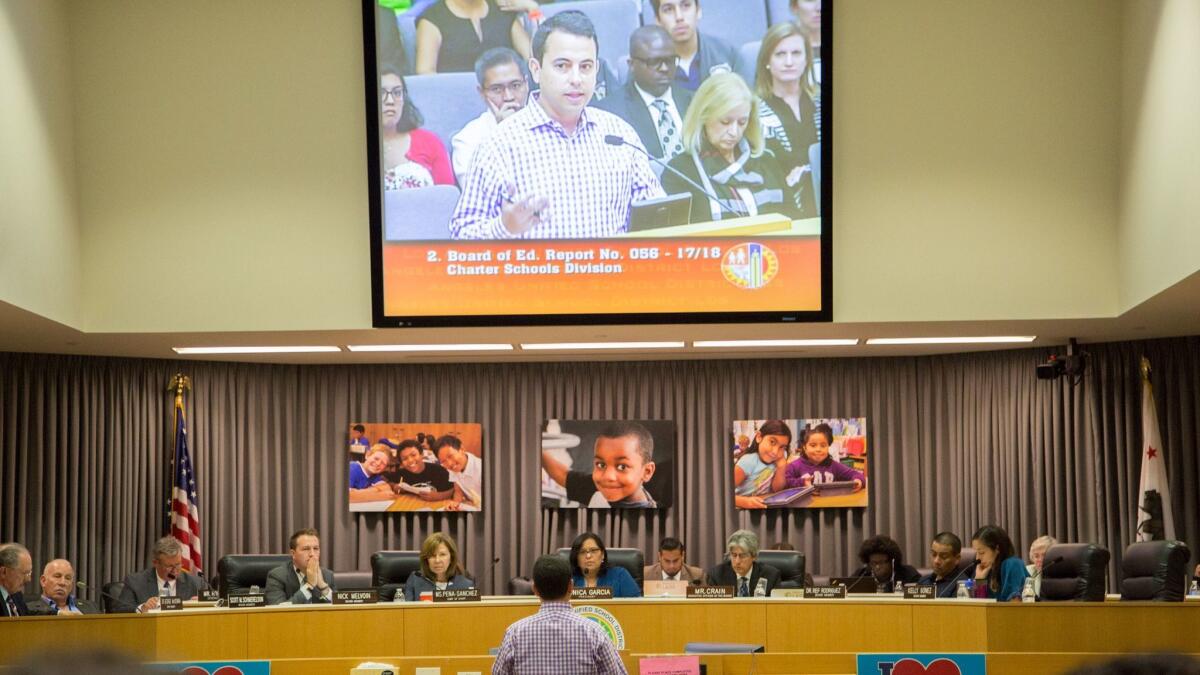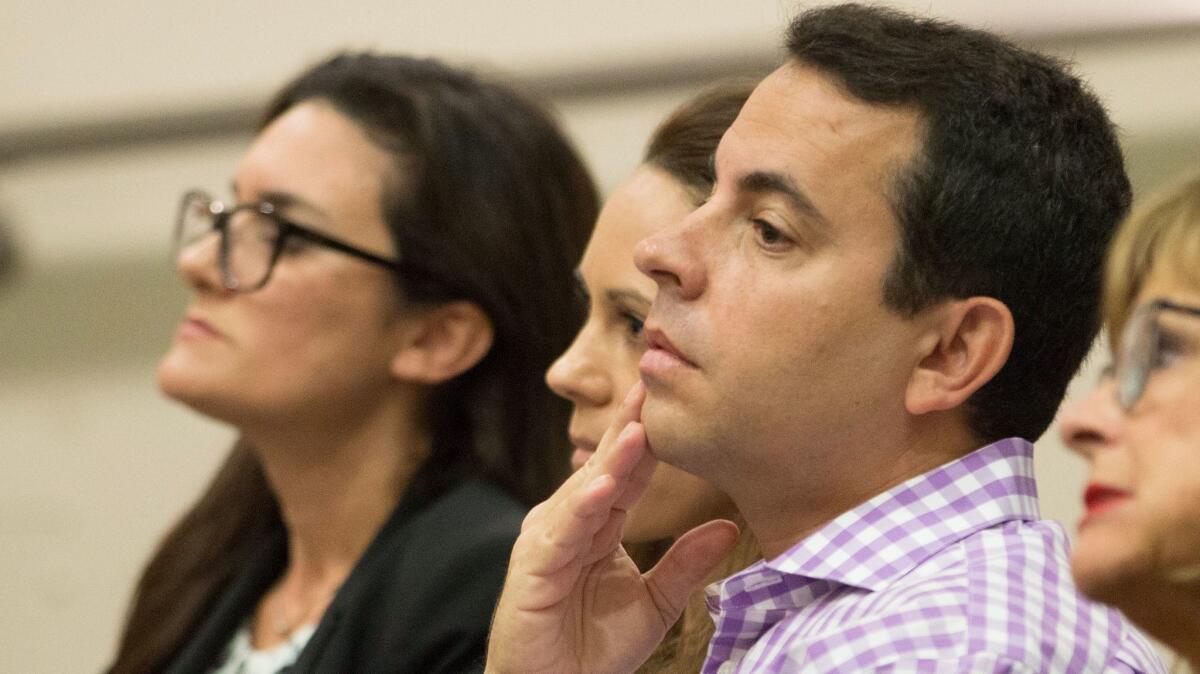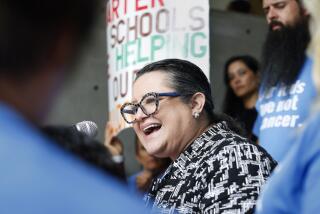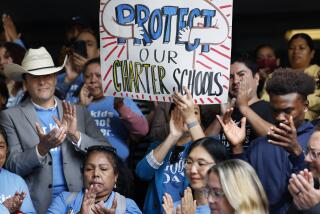Newly emboldened, L.A. charter schools push to rewrite local rules

A small Hebrew-immersion charter school found out on Tuesday that there were limits to how far it could push a new school board majority that is widely regarded as pro-charter.
But Lashon Academy Charter School’s challenge to the rules set by the Los Angeles Unified School District is widely seen as a sign of things to come.
The Los Angeles Unified School District authorizes and oversees most charters in its area, and the Van Nuys school, whose charter was up for renewal, had taken a stand, deciding to rebel against regulations that all charters under the district’s oversight have to follow.
In a July letter to district officials, Lashon’s executive director, Josh Stock, said he hoped the district would renew the school’s charter for another five years without making Lashon agree to legal language governing special education, school diversity and the circumstances under which charters can sue the district.
“We do not intend to negotiate our decisions” about that language, he wrote. And if L.A. Unified declined to renew the charter, the school would appeal the decision to the county.
If Lashon expected to be backed up Tuesday by the new board majority, that was not to be. The board voted not to renew the school, citing Lashon officials’ refusal to agree to specific language saying it would comply with a 1996 federal court order to improve special education services districtwide.
Lashon’s was just the first foray. Emboldened by charter advocates’ new clout on the school board, more than a dozen other charter schools are ramping up efforts to push back against regulations they consider burdensome. Many charter advocates say the rules have over the years gone far beyond the scope of California law and grown increasingly onerous.
Among the charter schools working to roll back rules, district sources say, are Alliance College-Ready Public Schools — the largest charter network in L.A. — and Magnolia Public Schools.

Charter schools are privately managed, publicly funded and exempt from some rules that apply to traditional schools. But not all of the rules. And L.A. Unified has added on some regulations of its own, as have other districts. Charters’ complaints to the board in the past mostly fell on deaf ears.
L.A. Unified officials say charter schools now are seeking to strike out portions of district rules and policy developed over two decades of experience that they say have made the school system a national model for charter oversight. These rules, they argue, have helped make many local charters successful and publicly accountable.
Jose Cole-Gutierrez, the director of L.A. Unified’s charter schools division, noted that, with 224 independent charter schools, the district is California’s largest charter authorizer. “We’ve learned a lot of lessons with our schools,” he said. “These are lessons learned to try to be helpful, not to try to undermine any autonomies.”
Following the Lashon vote, the group of 17 charter organizations, which calls itself the Los Angeles Advocacy Council, issued a statement asking for “reasonable improvements” to the district’s rules.
One of charter advocates’ targets is the district’s Office of Inspector General — an independent investigator — which often focuses on the district’s inner workings but has the power to open inquiries into charter schools’ operations, including confidential investigations that could lead to criminal charges.
Magnolia’s hiring practices have been the subject of a long-running inspector general’s review, and the office also has been looking into the finances of the Celerity Educational Group, which is under federal investigation as well.
Charter leaders also don’t like the requirement that their schools have to apply every year to use or keep using district school facilities. Some want long-term leases to give teachers and students stability.
Another rule charter supporters dislike requires charters to resolve disputes with the school district through mediation and binding arbitration, although charters can and have taken L.A. Unified to court. The district calls the rule cost-saving, but charter leaders say it denies them due process.
Lashon’s administrators ran into trouble when they removed language from their charter petition concerning a decades-old federal court order that grew out of a lawsuit brought against L.A. Unified by the mother of a student with a learning disability. Named for the student, the Chanda Smith Modified Consent Decree requires all L.A. Unified schools to expand educational offerings for disabled students and place more of these children in regular classes.
District officials said they didn’t have the authority to waive the order for charter schools. They said they needed Lashon’s guarantee in writing that it would abide by the order. Lashon responded that state law did not require that it adopt the district’s legal language wholesale. School administrators estimated that Lashon paid the district $140,000 last year for its share of special education costs, but Stock said it received no benefit.
“Putting our school into a contract for another five years with language we know we’re not comfortable with, I’m not sure that’s a responsible way to go,” said the school’s director of curriculum and instruction, Sara Garcia.
Board members praised the school’s academics and said they wanted to renew it — and the charter ultimately backed down from some of its demands — but disagreements remained. The Chanda Smith Modified Consent Decree is “nonnegotiable,” said board member Kelly Gonez, whose district includes Lashon.
Twitter: @annamphillips
Twitter: @howardblume
More to Read
Start your day right
Sign up for Essential California for news, features and recommendations from the L.A. Times and beyond in your inbox six days a week.
You may occasionally receive promotional content from the Los Angeles Times.








